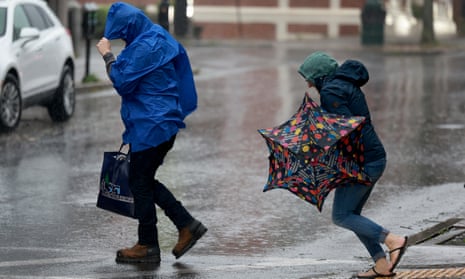
NOVA SCOTIA (Canada), Sept 17 (NNN-AGENCIES) — Post-tropical cyclone Lee made landfall in Nova Scotia, Canada, on Saturday afternoon hours after it battered New England and eastern Canada with powerful winds and rains.
The storm cut off electricity to tens of thousands and inundated coastal roads in Nova Scotia, and left at least one person dead. The 51-year-old man died after a tree limb fell onto his vehicle as he was driving in Searsport, Maine. The tree felled live power lines and workers had to turn off electricity before the man could be taken from his vehicle. He died at a hospital.
Though Lee was downgraded from hurricane status early on Saturday morning, the storm still carried winds of about 70mph (112km/h), Weather.com reported.
Forecasters issued a tropical storm warning for areas stretching from the New Hampshire-Maine border into Nova Scotia and Prince Edward Island. Large parts of New Brunswick and Nova Scotia, among them Halifax, were under a tropical storm warning, Weather.com said.
US President Joe Biden declared a state of emergency in Maine as Lee barrelled northward. Maine’s governor, Janet Mills, remarked: “I continue to strongly urge all Maine people, especially those Down East, to take the necessary precautions to stay safe as Hurricane Lee moves closer.”
The US’s National Hurricane Center (NHC) alerted residents of torrential downpours. “Heavy rainfall from Lee could produce localized urban and small stream flooding in eastern Maine into portions of New Brunswick and Nova Scotia from tonight into Saturday night,” the NHC said on Friday.
Lee – which at one point had achieved the highest intensity classification given to hurricanes, category 5 – battered Bermuda, the Bahamas and the US Virgin Islands with tropical storm conditions before moving northward.
The NHC warned that Lee was poised to cause “life-threatening surf and rip current conditions” – with waves of up to 15ft in some areas of coastal Maine. The conditions threaten erosion in Maine, which is the US’s most densely forested state.
Canadian authorities urged people to remain at home rather than venture outside. “Nothing good can come from checking out the big waves and how strong the wind truly is,” said Kyle Leavitt, the director of the New Brunswick Emergency Measures Organization.
Officials have predicted that Lee will not be as damaging as the tail end of Hurricane Fiona last year. Fiona’s waters washed homes into the Atlantic Ocean and cut off power to most of Nova Scotia and New Brunswick.
Meteorological authorities have described the 2023 Atlantic hurricane season as unprecedented. This summer’s uniquely warm sea surface temperatures – caused by the climate crisis – are fertile grounds for tropical storms and hurricanes. — NNN-AGENCIES
